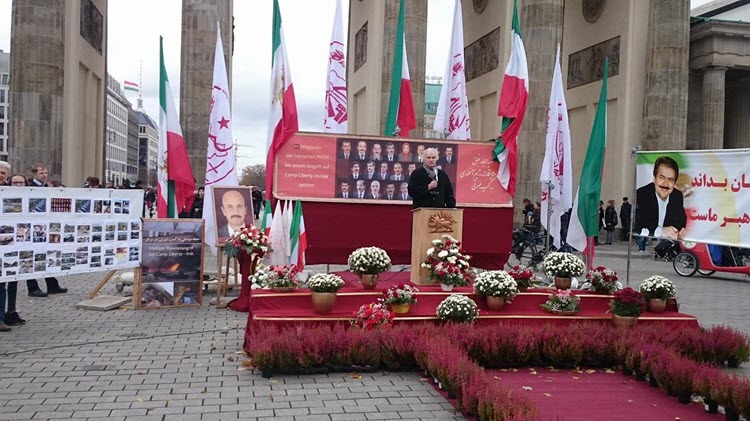
Iran Focus
London, 1 November – Mr. Christian Zimmermann, the Director of Human Rights and Minority affairs in Berlin commemorated those killed at Camp Liberty last year and raised important concerns in building relations with governments that don’t respect human rights, such as Iran.
On October 29 last year, Camp Liberty was struck by rockets, killing more than 20 people and injuring dozens. The Iraqi Shi’a militia, the al-Mukhtar Army, claimed responsibility for the callous act, as reported by Amnesty International. At the time, Camp Liberty was situated in the north-east of Baghdad and housed almost 2,250 Iranian exiles. Most of them were supporters of the People’s Mojahedin Organization of Iran (PMOI/MEK), the main opposition force to the Iranian regime, closely linked to The National Council of Resistance of Iran (NCRI).
Mr. Zimmerman remembered the victims who shed their blood that day: “Today, we commemorate the 24 members of PMOI/MEK whose pictures are behind me. They are only a small part of the thousands of people who have risen up against the religious dictatorship in Iran. They paid the price with their blood.”
He also took the opportunity to draw attention to the 1988 Massacre that took place in Iran, in an attempt to eradicate the followers of PMOI/MEK. “On my right side, you will see the written figure of 30,000. This figure is reminiscent of an incident in Iran,” Mr. Zimmerman said. “In 1988, Khomeini ordered a Fatwa called “the fatwa of death” which later acquired a reputation. According to the order, 30 thousand prisoners were executed and secretly buried. Until today, we do not know where they are buried and the “fatwa of death” is still valid.”
In the summer of 1988, Iran’s Supreme Leader Ayatollah Ruhollah Khomeini issued a new fatwa which ordered the death of many innocent victims – their only crime being their support for an alternative political system. Over the course of just a few months, thousands were killed, pregnant women and children among them.
The recently released audiotapes by Ayatollah Hossein Ali Montazeri’s son shed new light on the way these mass murders were carried out. They depict a meeting taking place between Montazeri who adamantly objects the unjust mass killings and the infamous Death Commission. From the tapes, it is clear that many of the officials who took part in these meetings and were responsible for executing thousands remain in leading positions within the Iranian regime today.
Mr. Zimmerman went on to express his concerns on Germany having commercial dealings and building relations with Iran today when their human rights record is so appalling. “The guilty of these crimes is a religious dictatorship that we are dealing with,” he said. “According to the German constitution, we are allowed to have good relations with the countries that defend the values of the French Revolution such as freedom, democracy, and equality. In these months, the German government wants to pass a law in order to coordinate the economic relations with the human rights.”
Mr. Zimmerman remained pessimistic about these plans. “But what will happen then? The German ministers, Mr. Sigmar Gabriel the Vice Chancellor, Mr. Alexander Dobrindt the Minister of Transport, and the Minister of Foreign Affairs Frank-Walter Steinmeier travel to Iran to negotiate and sign a contract, and yet they will not speak a word of human rights while the human rights should be a precondition for any talks with the Iranian authorities.”
Iran has an appalling record of human rights. Many recent stories have surfaced recently, where prisoners have been denied even basic rights, and executed without a fair trial, often on religious grounds, as in the case with the 25 Sunni prisoners who were executed this summer.
Mr. Zimmerman was firm about the right course of action for Germany to take in relation to Iran. “We need to stick to our moral values in the political arena. Now I ask my government to abolish the death penalty, as others do annually, and to impose a condition to respect the human rights in establishing relations and talks with Iran. This is the only way to start a conversation with them. We can only communicate on the same level provided that our common values of human rights are preserved. I cannot have a relationship with a country that executes 15 people each day. This is a disgrace and a shame for those who hold talks with such country.”


